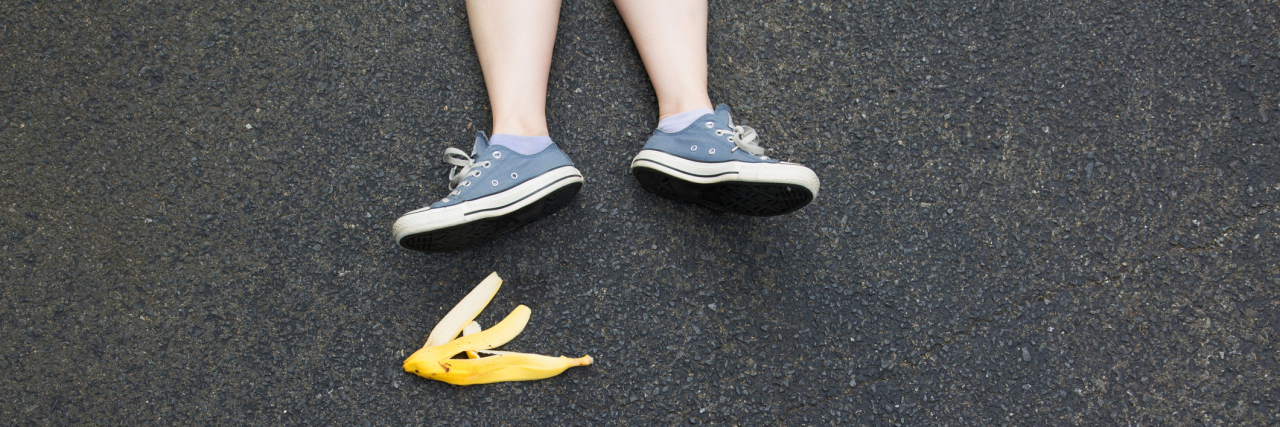I am a champion face-planter. I am also highly skilled at tripping over nothing, walking into door frames, and tipping things over. This illustrious title hasn’t won me any medals, rather the prizes I get, tend to be bruises, sprains, scrapes, and a bit of embarrassment. Lately, over a short time period, I fell three times, and when I brought it up with my therapist she asked me a surprising question: “Do you find that you are especially clumsy when you are in a triggered or dissociated state?”
Yes, indeed I am!
As a person with complex post-traumatic stress disorder (C-PTSD) I have a long list of symptoms. So this wasn’t a connection I had put together, but once she said it, this made a lot of sense to me. It’s also been helpful because it’s removed some of the shame I have around this, and instead I now focus on finding ways to gently curb my clumsiness. I’d like to share these five tips with you.
1. Wear good winter boots (or footwear) to avoid falls.
In Canada, we have an investigative TV show called “CBC Marketplace.” Right around when I was having this realization about my clumsiness, they did a show on how often folks fall on ice, and how a lot of winter boots are not actually safe. They also shared what some of the safer options are.
I’ve had lots of winter slips, so I decided to invest in a pair of ice-friendly boots. They were expensive, but I think it was worth it as I haven’t had any winter falls this season. Even if you don’t live somewhere icy, it is probably a good idea to pay attention to your footwear and whether or not it may be contributing to any clumsiness.
2. Use stair handrails.
I’m very gifted at falling on stairs. Now, I try to hold onto handrails when they are available and I also remind myself not to rush. I’ve also implemented a rule that I don’t mix stairs and scroll on my phone, so I can pay attention to where I’m putting my feet. I don’t always remember, and I still have some little tumbles, but I’m doing much better.
3. Try some strength training exercises.
Fitness spaces aren’t exactly my favorite thing and I’ve had some bad experiences with medical folks recommending exercise in dismissive and inappropriate ways. I do have a pretty rad chiropractor though, who is sure to go about things at a pace that I find safe and respectful. I finally agreed he could start teaching me some strengthening exercises with the goal of building up my muscles so I fall less. I like that this is a goal I can both understand and agree with; and so far, I’m doing well at keeping up with it all. I’ve also started back up with doing yoga, with similar goals. I’m only in the beginning stages of this training, but I do think it will be helpful in the long run!
4. Stop to breathe.
In order to keep my nervous system happy, there are a variety of things I’ve been learning to do that promote calm within me. As my therapist pointed out, I tend to be more clumsy if I’m in a more activated state. So by taking the time to take a breath, or to ground myself, I can pay better attention to what I’m doing. I’ve found this to be especially helpful when I’m rushing to get errands done, I know I’ve had less missteps because of it.
5. Clear clutter and stay organized.
OK, so this one is more so wishful thinking. I know it could help… but tidiness is not one of my strong suits. I try to follow some organizational rules. For example, my car keys are only allowed to be left in one of two places. I’m exploring getting some tracking devices for other items that mysteriously grow legs, like the TV remote. I’ve found when I have this type of frustration, I can indeed start tripping over stuff, so I think being proactive about it is useful.
For anyone out there who experiences being clumsy in the same way, I hope this list has been helpful or that it can encourage you to figure out what works for you! Is this type of clumsiness something that you experience? Had you ever considered that it may be a symptom of trauma? What are some of the ways you’ve had success with managing it, or what would you like to try? Share your thoughts in the comments below!
If you enjoyed this article, please take a moment to check out some of my other articles here on The Mighty. If you’d like to follow along with my journey, you can find me on Instagram as @mentalhealthyxe.
Getty image bydavidgoldmanphoto

